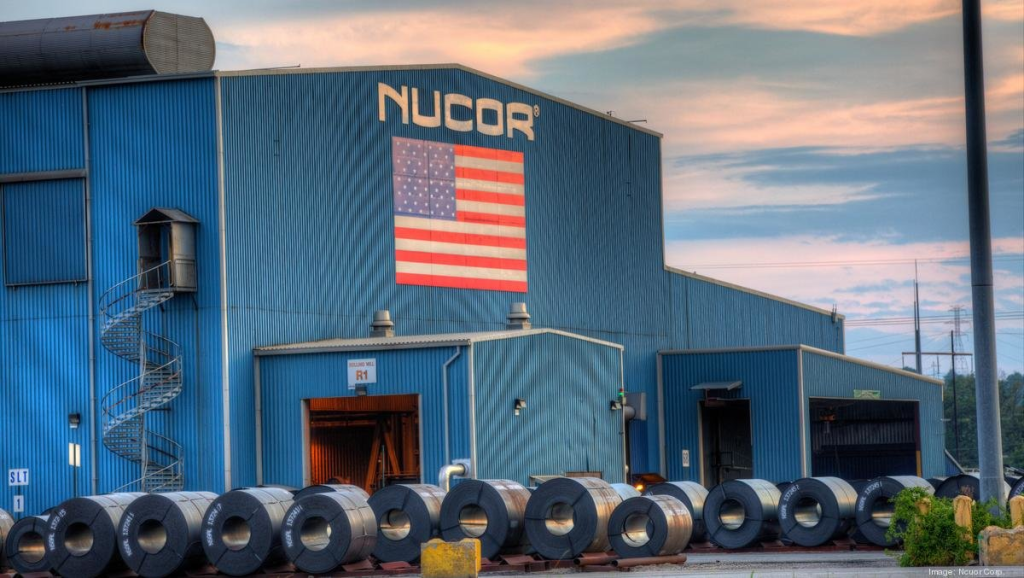Steelmaker Nucor Suspends Production After Cyber Attack Exposes IT Vulnerabilities

Hoplon InfoSec
15 May, 2025
Nucor Corporation, the largest steel manufacturer in North America, recently halted production at several of its facilities following a significant cybersecurity incident. The breach involved unauthorized third-party access to specific information technology (IT) systems, prompting the company to take swift action in response.
The Charlotte, North Carolina-based company is actively investigating the incident with the help of external cybersecurity experts. Nucor has also notified federal law enforcement authorities and is taking potentially affected systems offline to prevent further compromise. According to the company’s SEC filing, they are in the process of restarting the affected operations while implementing containment, remediation, and recovery measures.
Cybersecurity Risks in the Steel Industry

The manufacturing sector, particularly steel production, has become an increasingly attractive target for cybercriminals. According to IBM’s X-Force 2025 Threat Intelligence Report, the manufacturing industry has been the most targeted sector for cyberattacks for four consecutive years. Hackers exploit outdated legacy technology and vulnerable IT systems, resulting in data theft, production halts, and financial losses.
Steelmakers like Nucor rely heavily on automated systems for production, inventory management, and distribution. These interconnected networks streamline operations but also expand the attack surface for cyber threats. Vulnerabilities in legacy systems, lack of proper segmentation, and outdated security protocols can allow cybercriminals to infiltrate crucial systems, disrupting production and risking sensitive data.
Additionally, modern steel manufacturing processes involve Internet of Things (IoT) devices and cloud-based management systems, which further expose operations to cyber threats. Attackers can exploit weakly secured IoT endpoints to gain unauthorized access, disrupt operations, or steal confidential information. This integration of IT and operational technology (OT) makes cybersecurity not just an IT issue but a full-scale industrial challenge.
Immediate Response and Recovery Measures
Upon detecting the breach, Nucor activated its incident response plan. The company proactively took potentially affected systems offline and initiated recovery strategies to contain the incident. External cybersecurity experts were brought in to support the investigation and identify vulnerabilities exploited during the attack.
Nucor’s quick response highlights the importance of having a robust incident response plan. Shutting down systems immediately helps to prevent further damage and limits unauthorized access. Taking production offline, while disruptive, is a necessary step to safeguard critical infrastructure and maintain data integrity.
The company’s collaboration with federal law enforcement also underscores the severity of the incident. Notifying authorities early in the investigation can aid in identifying the attackers, recovering compromised data, and preventing similar attacks in the future.
In addition to taking systems offline, Nucor is likely conducting thorough digital forensics to trace the breach’s origins, analyze the scope of the compromise, and identify any potential insider threats. This forensic analysis is crucial for understanding how the attack unfolded and preventing future incidents.
The Growing Need for Cybersecurity in Industrial Manufacturing

The cyberattack on Nucor serves as a reminder of the growing cybersecurity threats facing industrial manufacturing. As steelmakers modernize operations with digital technologies, their exposure to cyber risks increases. Protecting these critical systems requires more than just traditional IT security; it demands industrial-specific cybersecurity measures designed to safeguard both physical and digital assets.
Some best practices for industrial cybersecurity include:
- Network Segmentation: Isolate critical systems from general IT networks to reduce attack surfaces.
- Regular Software Updates: Ensure all systems, including legacy equipment, are updated with the latest security patches.
- Multi-Factor Authentication (MFA): Enhance login security to prevent unauthorized access.
- Real-Time Monitoring: Deploy intrusion detection systems to identify unusual activities.
- Employee Training: Educate staff on recognizing phishing attempts and other cyber threats.
- Zero Trust Architecture: Implement Zero Trust principles to verify every connection within the network, minimizing the risk of lateral movement if one segment is breached.
- Industrial-Grade Firewalls and Encryption: Secure communication channels to prevent data interception during transmission.
Industry-Wide Implications of the Nucor Cyberattack
Nucor’s incident is not an isolated case; it represents a broader vulnerability within the steel industry and industrial manufacturing at large. As more companies adopt smart technologies and automation, their exposure to cyber threats grows exponentially. A single point of failure-like an unpatched server or weak password-can lead to widespread disruptions across supply chains.
This event serves as a wake-up call for manufacturers to rethink their cybersecurity strategies. Industry experts predict that without significant improvements in digital security, cyber incidents like this will become more common and more disruptive. For companies like Nucor, investing in proactive cybersecurity measures is not just about protecting data-it’s about safeguarding entire operations.
What’s Next for Nucor?

As Nucor moves forward with recovery, its focus will likely shift towards enhancing its cybersecurity framework. Strengthening IT infrastructure, increasing employee awareness, and implementing advanced monitoring systems will be key priorities.
Furthermore, Nucor may explore more stringent cybersecurity protocols, such as advanced threat detection powered by AI and machine learning, to predict and respond to threats before they escalate. Collaborative efforts with industry partners and federal agencies may also become a critical part of their strategy to bolster resilience against future cyber threats.
The steelmaker’s response to this breach may set a precedent for other industrial manufacturers. As cyber threats continue to evolve, proactive measures and strategic investments in cybersecurity will be crucial to safeguarding the future of industrial manufacturing.
Awareness and Prevention: What Manufacturers Should Know
For manufacturers looking to protect their operations from similar incidents, here are some essential steps:
- Conduct Regular Cybersecurity Audits: Identify vulnerabilities before cybercriminals do.
- Limit Third-Party Access: Only allow trusted vendors with stringent security measures.
- Improve Physical Security: Protect physical servers and critical equipment from unauthorized access.
- Test Incident Response Plans: Run simulations to ensure preparedness for actual breaches.
- Secure Remote Access Points: Use encrypted VPNs and MFA for remote connections.
The cyberattack on Nucor highlights the importance of prioritizing cybersecurity in industrial settings. As the sector becomes more digitized, the risks increase, demanding stronger defenses and vigilant monitoring. For Nucor and the broader manufacturing industry, the path forward is clear: invest in cybersecurity or face the consequences of vulnerable infrastructure.
Share this :